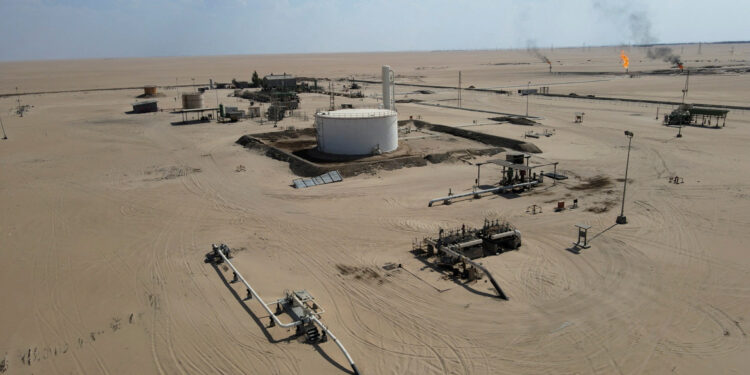8/29/2024–|Last update: 8/29/202403:56 PM (Makkah Time)
Libya’s latest oil shutdown has sent global energy prices soaring, so what brought the country to this point? Here are 5 reasons why.
1) How did the situation get to this point?
Since the 2011 Libyan revolution that toppled the late Libyan leader Muammar Gaddafi and plunged Libya into chaos, access to the country’s oil wealth has become the biggest prize for all political factions and armed groups.
Small local groups and larger nationalist groups have previously halted oil production as a tactic to demand a greater share of state revenues or political change. Libya’s current political stalemate stems from a faltering peace process that followed the 2014 split between warring eastern and western factions that formed rival governments.
In 2020, a ceasefire was reached as the offensive on Tripoli led by retired General Khalifa Haftar’s forces failed, and moves toward reunifying the country began in the run-up to elections scheduled for December 2021 under the interim Government of National Unity led by Abdul Hamid Dbeibah.
The dispute between the eastern and western factions has returned once again after the failure of political settlement efforts, and with it the competition over access to energy revenues has returned, with the latest confrontation focusing on control of the Central Bank of Libya.
Eastern factions, including the House of Representatives parliament led by its speaker Aguila Saleh and the so-called Libyan National Army led by retired Major General Khalifa Haftar, oppose the Presidential Council in Tripoli’s attempt to oust the governor of the Central Bank of Libya, Sadiq al-Kabir.
2) Who is besieging Libyan oil facilities?
For much of Sadiq al-Kabir’s 13-year tenure as governor of the central bank, eastern factions wanted him out and for a time backed a replacement governor who headed a parallel central bank based in eastern Libya, but now they are the ones demanding that Kabir stay on. Last week, the speaker of the House of Representatives, Aguila Saleh, warned of shutting down the oil sector if the central bank governor was ousted.
Protest groups in oil regions, which have often been a front in recent years for eastern authorities, said on Sunday they were occupying and shutting down energy fields.
The House of Representatives then issued a statement saying that Libya could not produce or export any oil due to the protests.
Retired General Haftar has described the move to replace him as illegal. Haftar’s forces still control all areas where the closures are taking place militarily, and analysts say he has developed a lucrative alliance with Kabir in recent months.
3) What do the protesters want?
In short, the eastern factions have one simple demand: the reinstatement of Sadiq al-Kabir as governor of the Central Bank of Libya. Behind this position lies the endless struggle between rival Libyan factions for control of energy revenues.
The last major shutdown in 2022 ended with Prime Minister Dbeibah in Tripoli replacing NOC chairman Mustafa Sanalla with Farhat Bengdara, long seen as close to Haftar.
The move has facilitated a tacit alliance between Dbeibah in the west and Haftar in the east, with looser controls on Libya’s lucrative oil sector and fuel imports, and the distribution of state funds for spending across the country.
When Kabir fell out with Dbeibah last year and began tightening the GNA’s restrictions, the stage was set for a showdown.
4) Is there any possibility of a deal?
No one seems willing to back down now, and the eastern factions are betting that by depriving the central bank of more funds, and by making it harder for it to operate internationally by challenging its legitimacy, the Tripoli authorities will be forced to capitulate.
The central bank is the sole legal recipient of Libya’s oil revenues and pays state salaries across the country. If these jobs are put at risk by the current crisis, Libyans will soon feel the pinch.
But this situation will affect both sides, and the Tripoli authorities may believe that the alternative of backing down and effectively giving up any influence over the bank – the only source of state spending – would be worse.
Meanwhile, Libya’s broader political conflict shows no sign of abating, and international diplomacy to resolve it through elections has stalled. If either side is considering armed action to resolve the dispute over the central bank, worse could be ahead.
5) How long can the oil blockade continue?
Oil blockades have become a familiar tactic in Libya’s chaotic and violent politics since the ouster of Gaddafi in 2011.
However, while smaller local lockdowns have sometimes been resolved within days, larger lockdowns linked to major political or military conflicts have sometimes lasted months.
The longest major blockade, when Haftar shut down almost all production in 2020 for eight months, was only resolved as part of a broader deal when his offensive on Tripoli collapsed.



